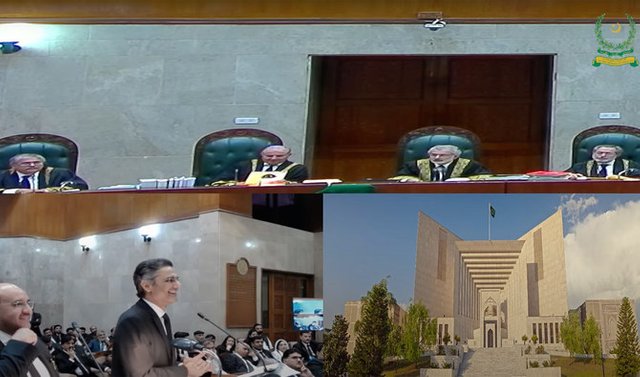Pakistan’s top court resumes hearing on alleged intelligence interference in judiciary
The Supreme Court took up the case after six high court judges accused powerful spy agencies of intimidating them
Chief Justice Qazi Faez Isa says that judgments and court orders ‘shout’ on their own if there has been any meddling
ISLAMABAD: Pakistan’s top court on Tuesday resumed the hearing of a case involving accusations by six high court judges of interference and intimidation by the country’s powerful intelligence agencies in judicial matters.
The Supreme Court of Pakistan took up the case after six out of the eight Islamabad High Court judges accused the military’s Inter-Services Intelligence (ISI) agency of intimidating and coercing them over legal cases, particularly those with significant political consequences.
The judges provided various examples of alleged interference, including a case concerning Pakistan’s imprisoned former prime minister, Imran Khan. They also mentioned incidents where they said their relatives were abducted and tortured, and their homes were secretly surveilled, aiming to coerce them into delivering favorable judgments in specific cases.
Chief Justice of Pakistan (CJP) Qazi Faez Isa, who has repeatedly noted that judicial meddling would not be tolerated, mentioned that such interference could occur in multiple ways.
“Interference can be from within and without, from intelligence agencies, from one’s colleagues and family members or from social media,” he said.
He maintained that judgments and court orders “shout” on their own if there has been interference.
The CJP initially constituted a seven-member bench that last heard the matter on April 3. However, the bench had to be reconstituted after Justice Yahya Afridi recused himself.
Prior to that, the top Supreme Court judge also discussed the matter with Prime Minister Shehbaz Sharif, during which it was decided to form an inquiry commission.
However, a former Pakistan chief justice, Tassaduq Hussain Jillani, who was asked to head the commission, recused himself, asking the Supreme Court to deal with the issue on an institutional level.
